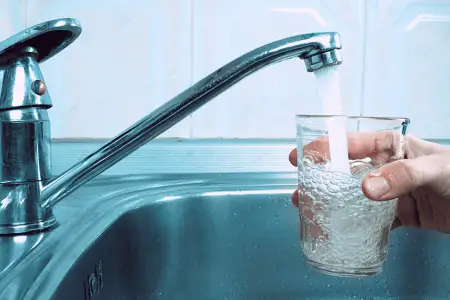The major difference between a water conditioner and softener is the way the minerals are removed from the water. A conditioner keeps the beneficial minerals but saves your appliances where a softener gets rid of everything.
How do you know which one you need?
When people have hard water they often don’t realize that they have a choice and go right for the salt based water softener type of system. The reality is that there are loads of choices and it isn’t always an obvious choice. You’re likely better off with a water conditioner.
Before you can decide which is best for you, make sure to test your water for hardness so you know exactly what your hardness level is. This will help you understand what you need as you will see as you read later on. I recommend this hardness test to get started.
In this article, I will go over the different scenarios involved so you know which one is going to be better for your needs to avoid making the wrong decision.
Do You Need a Water Softener or Conditioner?
As water conditioners primarily focus on the removal of water impurities and inhibition of contaminations and build-up of minerals, they do not remove the hardness of the water. In contrast, water softeners do not filter water contaminations rather than replace hard water minerals with soft minerals like sodium, etc.
Water hardness is measured in grains per gallon. The higher the grains, the harder your water. When you have a grains per gallon rating over 10, then you may want to use a water softener over a water conditioner.
Under 10 grains per gallon, though considered very hard, will likely be taken care of by a conditioner without using any salt.
It also depends on if you are looking to filter your water or just soften it to remove the hard water minerals.
In most cases, it makes far more sense to use a water conditioner as they don’t add salt to your water to soften it and waste far less water if any at all.
I’ll repeat, if your water is considered extremely hard, then a softener is probably the way to go. Otherwise, you should get a water conditioner.
How Do Salt Free Water Conditioners Work?
Unlike water softeners, water conditioners are systems that change the chemical behavior of hard minerals in water like calcium and magnesium. The way it works is that they change the ions in the minerals so they bind together and fall out of the water before it reaches your main water supply.
At the same time, they also remove things like chlorine and contaminants so you end up with pure water in addition to descaling to prevent your appliances from getting ruined.
There are different types of water conditioners so the process is somewhat different depending on the type which we will go over in a minute.
The main difference in these systems is they do not use salt to remove the minerals from water, and that is why they are also called salt-free conditioners. They are generally called scale inhibitors or water descalers.
Types of Salt Free Conditioners
In this section I will go over the several types that way you can see what your different options are as some will work better for your needs than others.
Electromagnetic Water Conditioners
Unfortunately, there is no hard data to determine exactly how these types of water conditioners work. The general idea is that a powerful magnetic field is created as the water passes through the pipes that have the device attached.
This changes the ions in the water which in turn change the ions of the calcium and magnesium particles and renders them harmless. In some cases the scales fall out of the water and are trapped in a reservoir. In other cases, the particles are allowed to pass through but they are unable to attach themselves to the pipes in your house or appliances.
Though these types of water softeners can be effective against low levels of hard water, if you have very hard water, then they are not likely to work that well. At least not on their own. Below is a link to one that comes highly recommended.
Carbon Filtration Based Water Conditioners
This type of water conditioner is not recommended against hard water. If your only problem is chlorine or sulfur smells in your water, then the carbon charcoal can absorb these contaminants and allow the purified water to pass through.
Some may claim to reduce scale or soften your water, but that simply isn’t the case.
If you have hard water in addition to other contaminants then a prefilter with activated carbon is always a great idea.
Electrolysis Based Water Conditioners
Acting much like a battery, the electrolytic descaler puts positive ions in the water with zin which then binds to the calcium carbonate. The calcium then becomes heavy and falls out of the water to be flushed away later.
The main problem with electrolysis is that eventually the anode that supplies the zinc will eventually be dissolved and useless without anybody knowing until the appliances start getting ruined. The only option is to guess as to when it needs to be replaced. How long they last is highly dependent on how hard the water is.
Template Assisted Crystallization Based Water Conditioners
Of all the different types of water conditioners, the TAC (Template Assisted Crystallization) are the best of the bunch. They work very efficiently and can handle most situations better than the other types. Like the electromagnetic type, they change the structure of the calcium and magnesium so they can’t stick to surfaces. In essence, the minerals are changed into hardness crystals.
The system contains resin beads as a media that the water passes through. These beads are ideal as they don’t need to be regenerated like the salt based water softeners that many people think that they need.
Another benefit of this type of water conditioner is that you can get a good sudsy soap lather going even though the crystals are still in the water.
This whole house water descaler by Aquasana is one of the best and at a great price.
- Clean, Great Tasting Water From Every Tap In Your Home - Activated carbon...
- High-Performance Filter System - Salt-free conditioner, carbon & KDF...
- Cost Efficient & Long Lasting - Clean water for less than dollars0.01 a...
- Easy Maintenance - No draining or back flushing needed - Easily replace pre...
- Top-Grade Install Kit & Components - System includes filter tank,...
Pros and Cons of a Water Conditioner System
Nothing is ever cut and dry so you’ll need to take a look at the advantages and disadvantages of these systems.
What We Like:
- Less wasted water from flushing minerals from media
- No salt added to domestic water
- Installation is very easy
- Less maintenance and no need to recharge resin
- Usually less expensive to buy
What We Don’t Like:
- Electronic systems use electricity
- The magnetic versions don’t work with high grain per gallon water
- Still builds up in water heaters over time
As you can see the pros outweigh the cons as they don’t really have much of an effect. One thing to note, however is that you may still have an accumulation of minerals at the bottom of a tank style water heater. Though it won’t accumulate on the anode or pipes, it acts more like a sediment that can build up over time.
Pros and Cons of a Salt Based Water Softener
If you have extremely hard water, then this section may not matter as you are likely forced into a salt based softener purchase. However, it is helpful to know what you are getting into.
What We Like:
- Gets rid of minerals completely
- No build up of minerals in water heaters
- Appliances run more efficiently
What We Don’t Like:
- More expensive to buy than a conditioner
- Water has higher levels of sodium
- Water is wasted when flushing the resin
- Resin needs to be recharged every 6 months
As you can see, a salt based water softener should only be used when a conditioner is not going to get the job done. And if you have problems with salt or high blood pressure, then a water softener is likely not an option.
If you do need to use a water softener over a water conditioner, then the SpringWell system below is very good.
- BETTER THAN BOTTLED WATER QUALITY AT EVERY TAP: Get great tasting water at...
- PROPRIETARY ACTIVFLO TECHNOLOGY: The ActivFlo filtration system is a...
- REMOVES HARMFUL CONTAMINANTS: SpringWell’s whole house water filter is...
- PREVENTS AND CLEANS EXISTING SCALE: Scale buildup is the result of...
- You will also receive detailed instructions. Included parts: Pre-Filter...
Sterling water softener reviews are also very positive, so you can check out that article for more information.
Water Conditioner Cost vs Softener Cost
A water conditioner is generally much less expensive than a water softener. Mostly because it doesn’t require a large amount of salt resin to descale the water.
In the case of the electronic descalers, they are generally under a couple of hundred dollars. The TAC versions cost quite a bit more but are still generally half as much as the cheapest whole house water softener.
They also cost far less to maintain as they don’t need to be recharged. The resin in a water softener is not cheap and needs to be recharged a couple of times per year.
Our Verdict
It seems that the choice is clear when it comes to water conditioners vs water softeners. Unless you have very hard water over 10 grains per gallon then a conditioner is the way to go. They cost less, are easier to maintain and don’t waste any water. And, they don’t make your water taste salty.

Nick Lopresti is the founder of YourH2Home and a home improvement expert. He has years of experience writing about various home improvement topics, mostly as it pertains to water systems.

![Capacitive Electronic Water Descaler System - Alternative No Salt Water Softener System for Whole House, Reduces The Effects of Limescale [CWD24, Max 1" Pipe]](https://m.media-amazon.com/images/I/41jlfqUJrrL.jpg)




